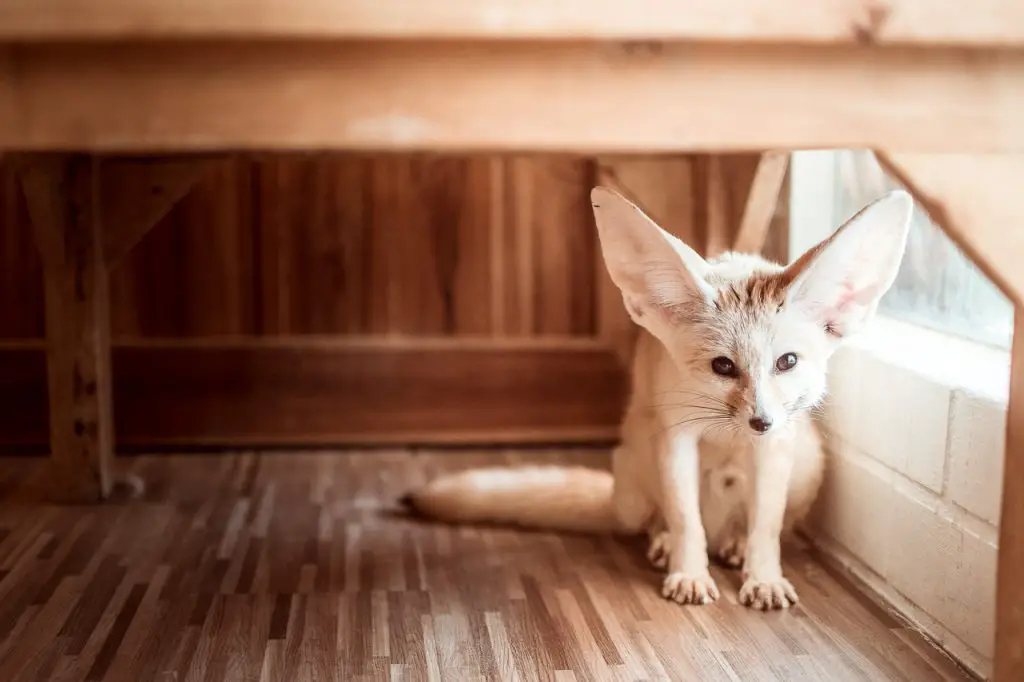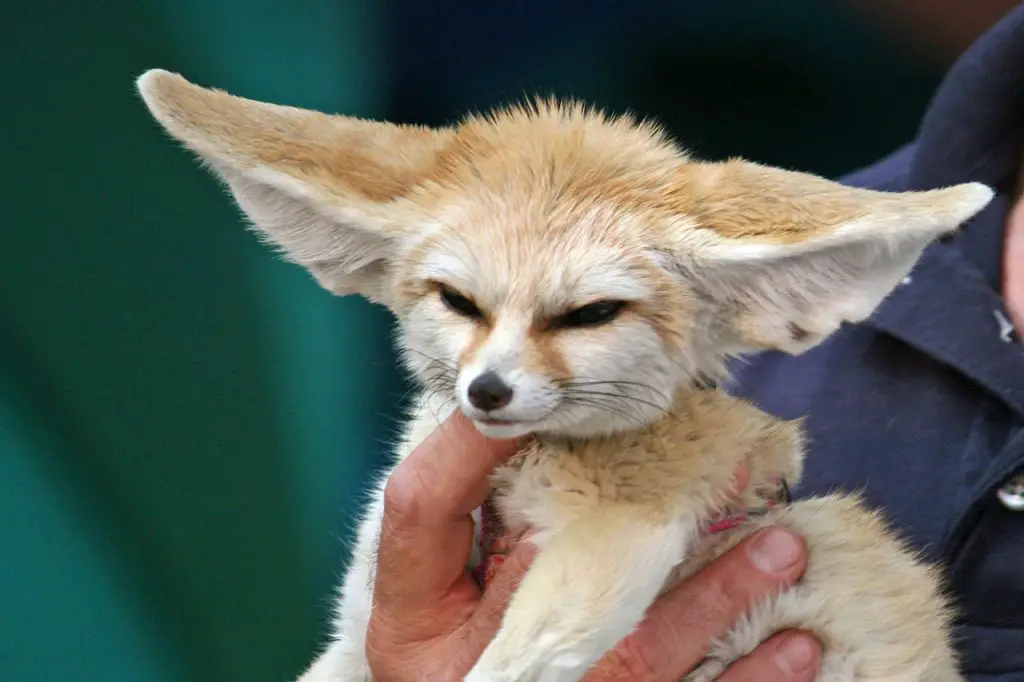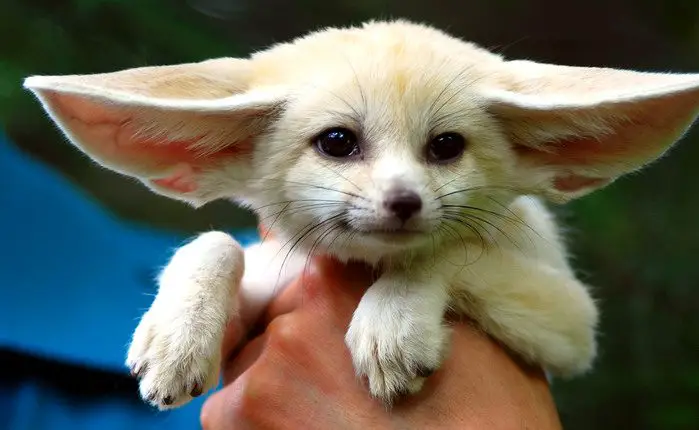Do Fennec Foxes make great pets? That is a question that many people are asking themselves these days.
The popularity of Fennec Foxes as pets has been on the rise in recent years, but there are still many people who are not sure if they would be a good pet choice.
In this blog post, we will take a look at the pros and cons of owning a Fennec Fox and help you decide if this is the right pet for you!
- Key Takeaway
- Do Fennec Foxes Make Great Pets?
- Are Fennec Foxes High Maintenance?
- Do Fennec Foxes Have Special Dietary Needs?
- Do Fennec Foxes Like To Cuddle?
- Are Fennec Foxes Good Pets For Kids?
- Do Fennec Foxes Get Along With Other Pets?
- Are Fennec Foxes Active?
- Are Fennec Foxes Vulnerable To Disease?
- FAQs
- Q: Can I have a Fennec Fox as a pet?
- Q: Are Fennec Foxes legally allowed as pets?
- Q: What are the main considerations before getting a Fennec Fox?
- Q: Do Fennec Foxes require a lot of space?
- Q: What should I feed a Fennec Fox?
- Q: Do Fennec Foxes need any special care?
- Q: Are Fennec Foxes good with children?
- Q: Can Fennec Foxes be litter trained?
- Q: Are Fennec Foxes noisy?
- Q: How long do Fennec Foxes live?
- Conclusion and final thoughts
Key Takeaway
- While Fennec foxes can be energetic, playful, and social animals that adjust to life with humans, they are wild animals by nature, requiring specific care and environment, which makes them suitable as pets for only those who can meet these needs.
- Fennec foxes have special dietary needs as they are omnivores that consume a variety of foods including fruits, root vegetables, insects, small rodents, eggs, and reptiles, with a need for high protein and an important nutrient, Taurine.
- Fennec foxes are generally not fond of cuddling, as they are wild animals with a natural skittishness and may bite if scared or nervous, although they can show affection and friendliness once they are used to a person.
Do Fennec Foxes Make Great Pets?

Fennec foxes can make great pets for the right person, but they also have some unique needs that must be considered before bringing one into your home. The pros of owning a fennec fox include its adorable appearance, intelligence, and playful nature. They are also relatively small animals, which means they don’t require a lot of space.
People love foxes because they are cute, sly, and funny. Once they get used to a home environment, they can form a strong bond with their pet parents.
It’s best to raise a fennec fox from birth to make it best adapt to its home environment.
Of all the fox species, people most prefer to raise Fennec foxes as pets. This is because of their small size, oversized ears, and great personality. They are almost like chihuahuas, although that being said, never mistake any pet fox for a dog because they cannot replace a dog.
In addition, although their appearance is like dogs, their personality most resembles that of cats. More so, just like dogs, foxes are canines. But unlike dogs, they can climb trees.
However, there are also some cons to consider before deciding if a fennec fox is the right pet for you. They can be difficult to train and may not always obey commands. They also require a lot of attention and can be quite destructive when bored.
Note that the wild instincts of fennec foxes (or any other fox) are quite strong. So, although you can tame them, you can only do so to a certain extent.
Are Fennec Foxes High Maintenance?

Fennec foxes are not high-maintenance pets. They do not require a lot of space and can live in relatively small areas. They also do not need to be exercised excessively and can get by with a moderate amount of activity. However, they do require some specific care in order to stay healthy and happy.
Fennec foxes should have a diet that consists mostly of meat. They also need access to fresh water at all times. Additionally, their living area should be cleaned regularly and provided with plenty of enrichment items such as toys, puzzles, and hideaways. With proper care, fennec foxes can make wonderful pets for people of all ages.
Fennec Foxes are escape artists. You must therefore fox-proof their room to keep them from going outside. They like to dig, and can also break things during play.
Outdoor housing may be more ideal for a fennec fox as it gives them a natural place to climb, forage, dig, and generally make a mess. However, you still need to ensure that their enclosure has big trees or a platform that provides them a climbing challenge.
Their diet should be made up of 90% lean meat and 10% vegetables or fruits. This means that you should constantly have on hand a fresh supply of proteins such as rabbit and chicken, or insects such as silkworms and mealworms.
Do Fennec Foxes Have Special Dietary Needs?

No, Fennec foxes do not have any special dietary needs. They are omnivores and can eat a variety of different things, including insects, rodents, fruits, vegetables, and eggs. This makes them relatively easy to care for in captivity.
However, it is important to provide them with a diet that is high in protein and fiber to ensure they stay healthy. Some good food options for Fennec foxes include crickets, mealworms, chicken liver pate, and scrambled eggs. You can also give them fresh watermelon or other fruit as a treat. Just be sure to supervise your fox when he or she is eating so they don’t choke on anything!
However, there are some foods that you shouldn’t feed your Fennec Fox with. Too much retinol in a Fennec Fox’s diet can damage the kidneys and liver. A diet of rats and mice (which have high levels of retinol), may therefore not be good and should only be fed rarely. Feeder lizards make a good alternative for regulating retinol levels.
Taurine is also important to their health and as this is not found in packaged dog and cat food, you have to provide supplements says Pet Keen.
If your yard is large enough, you may want to raise your own crickets, mealworms, and Dubia roaches to feed your Fennec fox.
Do Fennec Foxes Like To Cuddle?
A study published in the journal Royal Society Open Science sought to answer this question. The study found that Fennec Foxes do not like to cuddle, but they will tolerate being held by humans if they are used to them.
The study also found that fennec foxes have a strong preference for sleeping in solitary dens and that they generally avoid contact with other fennec foxes. This is likely because fennec foxes are territorial animals and like to maintain their personal space.
So, while we may not be able to snuggle with these adorable creatures, at least we know they won’t mind if we give them a pat on the head!
Fennec foxes are cute. So cute in fact that most people are fooled into thinking that they are laid back, and can be handled just like any other fluffy domestic pet. But this couldn’t be farther from the truth.
Fennecs are quite energetic, hyperactive, calculating animals. Although they will let you pick them up and pet them, they don’t like it very much. They are quite independent and prefer not to be cuddled.
Fennec foxes get very easily spooked. They are easily preyed upon due to their tiny size. They are therefore always on the lookout for predators. As such, they prefer to keep a safe distance as they observe the goings-on in their environment. This can make them aloof pets.
Fennec foxes are also quite loud and express their emotions in sounds that can vary from chirps to barks, and even growls. If you like a quiet pet, a fennec is not the right pet for you given how vocal it can be.
Are Fennec Foxes Good Pets For Kids?
Fennec Foxes are good pets for kids that are older than 7 years that have had some kind of a pet before. Fennec foxes are often thought of as good pets for kids, but there are a few things to consider before getting one.
They are nocturnal animals, so they may be active and vocal at night when your child is trying to sleep. They also have a strong instinct to dig and burrow, so your child’s play area may end up looking like a construction site. And since fennec foxes are wild animals, they can be unpredictable and may bite if they feel threatened.
So, while a fennec fox might make a cute and unique pet for your child, there are some potential drawbacks to consider before making the commitment. If you do decide to get a fennec fox, be sure to do your research and make sure you can provide the right type of care for this special animal.
That said, fennec foxes are definitely adorable creatures and can provide lots of fun and companionship for kids (and adults!) who are willing to put in the work required to care for them. If you’re up for the challenge, a fennec fox may just be the perfect pet for your family!
On other hand. Fennec Foxes have tiny bones and can be easily injured by young kids who are likely to drop them or rough-handle them. Kids can also agitate a fennec fox by imitating its vocalizations. If it’s vocalizing out of fear or agitation, this can result in a bite attack.
This is why it is important that your kid understands that they can easily hurt the fox. A kid that already had a pet (dog, cat, rabbit, or even a hamster) understands and accepts the responsibility of keeping a pet. But even then, you will need to provide supervision until you make sure that your kid is fully ready.
Do Fennec Foxes Get Along With Other Pets?
Yes. You can keep a Fennec Fox together with other pets of the same size. They get along just fine with pet rabbits, hamsters, and guinea pigs. In addition, you should introduce them to each other at a young age. However, some pets like hounds or retrievers might confuse the fox as prey and attack them.
Fennecs are hardy as they are used to surviving on their own. Their energy levels are highest after feeding, and this is when they will most likely bite.
If you have other small animals in your home, such as rabbits or guinea pigs, it is likely that the fennec fox will get along well with them. However, some dogs like hounds or retrievers might confuse the fennec fox for prey and attack it.
Introducing a fennec fox into a home with existing pets should always be done under close supervision and with caution. If all goes well, your fennec fox and other pets can live together in perfect harmony! But if things don’t work out, it is important to be prepared to separate them safely.
Are Fennec Foxes Active?
Yes, fennec foxes are active animals. They are mostly active at night, but can also be seen during the day. They usually sleep in their dens during the day and come out at night to hunt for food. Fennec foxes are not afraid of humans and will often approach them out of curiosity.
Fennec foxes are very active. They love to play and explore their surroundings. A bored fennec fox can become destructive, so it is important to keep them busy with toys and activities. Fennecs are also known for being escape artists, so it is important to have a secure enclosure for them.
Their activity usually involves digging. Once they start digging, they can go pretty deep. This digging behavior is most likely driven by the instinct to find food such as rodents or insects.
They are very social animals and love to be around people and other animals. Fennec foxes make great pets for active families who can provide them with the stimulation they need.
If you see a fennec fox in the wild, it is likely that it is more interested in you than you are in it! However, if you do not want the fennec fox to approach you, make yourself appear as uninteresting as possible by standing still and avoiding eye contact. The fennec fox will eventually lose interest and move on.
Are Fennec Foxes Vulnerable To Disease?
Yes, fennec foxes are vulnerable to a variety of diseases. Their small size and lack of natural defenses make them susceptible to illnesses carried by other animals, as well as parasites and infections. Some of the most common diseases that affect fennec foxes include:
- Kidney problems. This health issue may result from a diet low in calcium. Overfeeding can also cause kidney failure in a fennec. It is however possible to reverse kidney failure with food fortified with Vitamin D and Calcium.
- Worms. A fennec fox can suffer from a worm infestation if it’s got fleas in its coat. It is therefore important to treat your fennec’s coat to eliminate any fleas.
- Pancreatitis. This health condition is caused by feeding a fennec fox on a fatty diet or foods typically eaten by humans. Pancreatitis is a difficult condition to treat and may even result in death. So only feed your pet fennec on a fox diet, not a human diet.
- Canine distemper virus. Canine distemper virus is a highly contagious viral disease that affects dogs, foxes, and other members of the dog family. The virus can cause severe respiratory illness, including pneumonia, and neurological problems such as seizures. There is no specific treatment for canine distemper virus infection, and many animals die from the disease.
- Rabies. Rabies is a serious and potentially fatal illness in both animals and humans, so early diagnosis and treatment are essential for the best possible outcome.
- Leptospirosis. Leptospirosis is a serious disease that can cause fever, muscle pain, and vomiting in infected animals. In some cases, it can lead to kidney failure or even death. It is important to keep your fennec fox away from any sick or injured animals.
- Toxoplasmosis. This disease is caused by a parasite that lives in the gut of cats and is spread through their feces. Infected animals can shed millions of these parasites in their feces, which can then contaminate food or water sources and infect other animals.
- Sarcoptic mange. Sarcoptic mange is a serious skin condition that can affect dogs, cats, and other animals. It’s caused by a type of mite that burrows into the skin, causing intense itching and irritation. While fennec foxes are not immune to this condition, they are less likely to get it than other animals.
- Heartworm disease. Heartworm disease is a serious and potentially fatal condition that affects dogs, cats, and other animals. If your fennec fox has heartworm disease, it is important to get treatment right away. Treatment for heartworm disease can be expensive and may require hospitalization.
FAQs
Q: Can I have a Fennec Fox as a pet?
A: Yes, it is possible to own a Fennec Fox as a pet, but it is important to consider several factors before making this decision.
Q: Are Fennec Foxes legally allowed as pets?
A: The legality of owning a Fennec Fox as a pet varies depending on your location. It is essential to research the local laws and regulations before getting one.
Q: What are the main considerations before getting a Fennec Fox?
A: Before getting a Fennec Fox, you should consider their specialized needs, such as a spacious enclosure, proper diet, socialization, and regular veterinary care.
Q: Do Fennec Foxes require a lot of space?
A: Yes, Fennec Foxes require a significant amount of space to thrive. They need a large outdoor enclosure with plenty of room for exercise and exploration.
Q: What should I feed a Fennec Fox?
A: A Fennec Fox’s diet should consist of a balanced mix of high-quality commercial fox food, lean meats, insects, and occasional fruits and vegetables.
Q: Do Fennec Foxes need any special care?
A: Yes, Fennec Foxes have special care requirements. They need regular grooming, nail trims, and dental care. Veterinary check-ups are also crucial to monitor their health.
Q: Are Fennec Foxes good with children?
A: Fennec Foxes are generally not recommended as pets for families with young children. They have specific needs and may not tolerate rough handling or excessive noise.
Q: Can Fennec Foxes be litter trained?
A: Yes, with patience and consistent training, Fennec Foxes can be litter trained. Providing a suitable litter box and reinforcing positive behavior will help in the process.
Q: Are Fennec Foxes noisy?
A: Fennec Foxes are generally not very noisy animals. They are more vocal during breeding season and may make occasional barking or howling sounds.
Q: How long do Fennec Foxes live?
A: Fennec Foxes have a lifespan of around 10-15 years in captivity when provided with proper care and a suitable environment.
Conclusion and final thoughts
In conclusion, Fennec foxes can make great pets given the right environment and owners.
They need plenty of space to roam in a safe area, and they require dedicated owners with the resources needed for their diet, housing, enrichment activities, veterinary visits and more.
Owners should also be aware of potential behavioral challenges like digging or vocalizing that could arise as a result of their natural behaviors.




